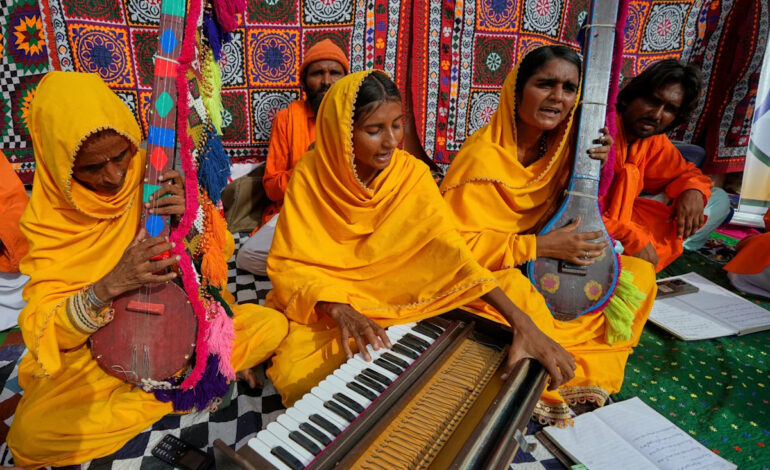Pakistani Musicians Use Folk and Rap to Combat Climate Change

In rural Pakistan, musicians are harnessing the power of folk songs and rap to raise awareness about the pressing issue of climate change. In the Umerkot district of Sindh, the folk singer Sham Bhai captivates villagers with poignant lyrics that reflect the devastation caused by climate-related disasters. Her performances serve as both entertainment and education, aiming to inform communities about the urgent need for climate adaptation.
Sham hails from Sindh, a region that suffered catastrophic flooding three years ago, impacting millions and destroying homes, farmland, and infrastructure. During her two-year tour of various villages, she has used her music as a medium to communicate the challenges posed by climate change. “When we give a message through song, it is easy to communicate to people because they understand it,” the 18-year-old artist explained.
In her songs, Sham sings in Sindhi, the provincial language more commonly understood than Urdu, the national language of Pakistan. Her lyrics resonate deeply with her audience, particularly given that Sindh recorded over 1,000 rain-related deaths in just a few months in 2022. The scars of these disasters remain evident, with many homes still in ruins and entire communities grappling with the aftermath of severe weather.
The lyrics of Sham’s song highlight the vulnerabilities faced by families, particularly women and children, during extreme weather events. “The meaning of the song is that poor people’s homes built on mud are not strong,” she noted. This sentiment echoes throughout the region, where local farmers are adapting their agricultural practices to cope with unpredictable weather patterns.
Ghulam Mustafa Mahar, a local farmer, shared that the monsoon season has become erratic. “The monsoon season used to come on time, but now it starts late,” he stated. Many have shifted their focus from traditional crops to livestock as a survival strategy amidst ongoing climate challenges. The lack of infrastructure compounds these issues, with roads in dire condition and low literacy rates hindering effective communication about climate change.
The situation is exacerbated for women, who often bear the brunt of climate-induced hardships. In rural Sindh, traditional gender roles restrict women to domestic work, leaving them particularly vulnerable when disasters strike. A villager recounted the loss of lives when heavy rains collapsed homes in 2022, emphasizing the urgent need for targeted assistance and awareness.
In a related effort, activist Urooj Fatima, known as Sindhi Chhokri, is using rap music to engage younger audiences and spread awareness about climate change. Following devastating floods in her village in 2022 and again in 2024, she recognized the importance of reaching wider audiences through hip-hop. “We can engage a lot of audiences through rap,” Urooj explained. “If we go to a village and gather a community, there are a maximum of 50. But everyone listens to songs.”
Although hip-hop is not widely recognized in Pakistan, Urooj believes its roots in storytelling make it an effective vehicle for discussing social issues, including climate justice. She has crafted impactful lyrics that address the struggles faced by her community, often highlighting the inadequacies of governmental responses to climate disasters.
“Where was the Balochistan government when the floods came? My pen thirsts for justice,” she raps, emphasizing the need for governmental accountability and support. Alongside her sister Khanzadi, Urooj actively campaigns for climate awareness, visiting villages and planting thousands of trees in an effort to combat environmental degradation.
The impact of climate change on women and girls is a central theme in Urooj’s work. She cites the disproportionate challenges they face, including displacement, lack of education, and inadequate access to resources. “For women, there are no opportunities or facilities. And then, if a flood comes, they face more difficulties,” she noted.
Despite receiving mixed reactions to her activism, Urooj remains steadfast in her mission to use music as a tool for change. “Rap is a powerful platform. If our rap reaches just a few people, then this is a very good achievement,” she asserted. Through their performances, both Sham Bhai and Urooj Fatima are not only raising awareness but also inspiring action among vulnerable communities in Pakistan.
Their efforts highlight the critical intersection of culture and climate action, demonstrating that music can be a powerful medium for education and advocacy in the face of growing environmental challenges.






